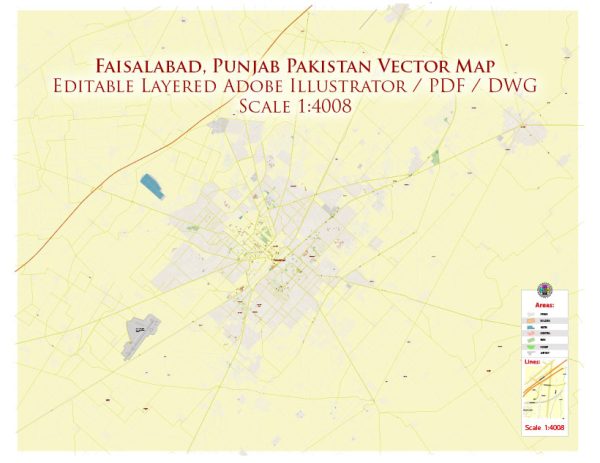Faisalabad, formerly known as Lyallpur, is one of the major cities in Pakistan and is the third-most-populous city in the country. It is located in the Punjab province of Pakistan and has a rich history that dates back to ancient times. Here’s a brief description of Faisalabad’s history:
- Ancient History: The region around Faisalabad has a history dating back thousands of years. It has been home to various ancient civilizations, including the Indus Valley Civilization, which thrived in the area around 2600-1900 BCE. Archaeological remains in the region testify to the presence of these ancient cultures.
- British Colonial Era: Faisalabad’s modern history begins with the British colonization of the Indian subcontinent. The city was founded in the late 19th century during British rule. In 1880, Sir James Lyall, the then Lieutenant Governor of the Punjab, established the city and named it Lyallpur in his honor. It was planned as an agricultural and industrial center.
- Agricultural Hub: The city quickly became known for its agricultural activities and played a crucial role in the “Green Revolution” of the 1960s and 1970s. The fertile lands surrounding Faisalabad were used for the cultivation of cotton, wheat, and sugarcane. The city earned the nickname “Manchester of Pakistan” due to its textile and garment industry.
- Partition and Independence: After the partition of India in 1947, Faisalabad, like many other cities in the region, experienced significant demographic changes. It became a part of Pakistan and was renamed Faisalabad in 1977 in honor of King Faisal of Saudi Arabia.
- Industrial Growth: Faisalabad’s economy continued to grow, with an emphasis on the textile industry. It is a major center for textile production in Pakistan, with numerous textile mills, processing plants, and garment manufacturing units.
- Education and Culture: Faisalabad is also known for its educational institutions, including the University of Agriculture, Government College University, and other schools and colleges. The city has a rich cultural heritage, with a blend of Punjabi, Urdu, and other cultural influences.
- Economic Importance: Faisalabad remains a significant economic hub in Pakistan, contributing substantially to the country’s industrial and agricultural sectors. It is a major exporter of textiles, garments, and agricultural products.
- Modern Development: Over the years, Faisalabad has seen significant modernization and urban development. It has expanded as a commercial and industrial center and is known for its bustling markets and business activities.
Faisalabad’s history is intertwined with the growth of Pakistan’s industrial and agricultural sectors. It has evolved from a planned British colonial city to a thriving metropolis with a diverse and dynamic economy.


 Author: Kirill Shrayber, Ph.D.
Author: Kirill Shrayber, Ph.D.